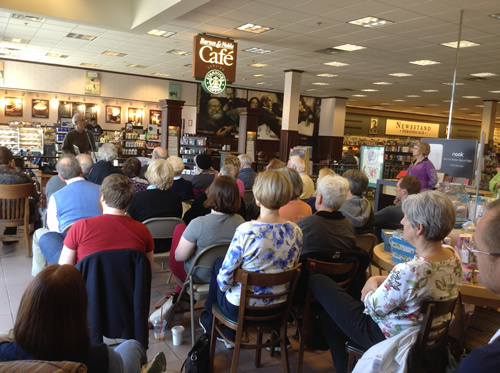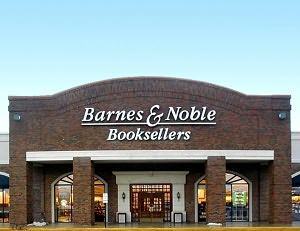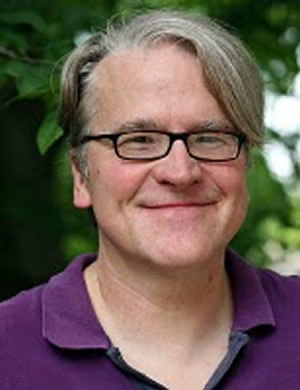Ed Davis's Blog, page 4
June 12, 2015
Honoring the Glen: A Concert & Art Show
Sacred Space
For so many in the Miami Valley, Glen Helen in Yellow Springs is one of the area’s best nature destinations if not a sacred site. For me, it’s both; some days I need an aerobic walk; on others, I need to wander, dream and write poetry. But I always feel Helen’s healing power.
On Saturday, June 27, 2015, Honoring the Glen: A concert and Art Show (and fundraiser for the Glen) will be co-hosted by Antioch University Midwest and Tecumseh Land Trust, beginning with an art show and simultaneous kids’ activity from 5-6:45 p.m. Attendees will also be treated to the all-Glen paintings of Roger Smith as well as work by Leah Grohmann. If you come hungry, La Pampa Argentine Grill will be open for business in AUM’s parking lot by 5:00. Free desserts will be available inside, all of which will whet your appetite for the evening’s main event.
Inspired by the Glen
Shortly after 7:00 p.m., guitarist/singer/songwriter Scott Lindberg and his duet partner Amy Blue, along with bass player Matt Minde and percussionist Ryan Stimson, will take the stage to perform original songs inspired by Glen Helen.
If you’d like a preview, visit www.yellowspringsmusic.com. They’ll be even better live, as the energy flows among audience, performers and inspirational source—Glen Helen. And Antioch University Midwest has provided the perfect setting with its comfy, acoustically fine auditorium. There may even be a door prize or two.
Buy Tickets Now!
Tickets are $5 now, $7 on the day of the show and are available at the following Yellow Springs businesses (or by calling Scott at 776-4790):
Rita Caz Jewelry
La Llama Place
Dark Star Books
Epic Bookshop
The Emporium
Village Herb Shoppe
It’s Even Literary
Scott and Amy have asked me to kick off the show with a couple of Glen Helen-inspired poems. It should be a memorable evening as we invoke the spirit of Helen Birch Bartlett, for whom the 1,000-acre Glen is named, with word and song.
Don’t Get Lost!
The event takes place at Antioch University Midwest (not Antioch College), 900 Dayton Street, Yellow Springs, Ohio, which is located at the intersection of Dayton Street and East Enon Road at the village’s western edge. Watch for signs guiding you to the parking lot. Directions are available at http://antiochmidwest1-px.rtrk.com/about-aum/driving-directions/
I hope to see you there!
May 26, 2015
Editing 102: Ownership
May 26, 2015
To truly benefit from someone’s critiquing/editing of your fiction, you need to be extremely open and receptive but not to the point where you lose ownership of your writing. But, you ask, how can you make sure you’ve not ceded ownership to another person, even unconsciously?
Using your innate writerly instincts for what does/doesn’t work in a story, try hard to develop greater intuition: inner voices that suggest you’re on- or off-track. After a while, you should be able to do this not only as you’re revising your fiction but even as you write!
As you listen to or read someone’s critique of your work, make sure to:
Consider the source. Most of the folks who critique your work are well-intentioned; however, they aren’t all equally qualified. You can find out by (a) inquiring politely about their tastes, reading and writing interests and publications, if any; and (b) listening carefully for such proofs in their critiques (“I only read mysteries”). As for family members, only use them if you’re capable of the greatest humility and objectivity.
Be wary of quirky prejudices. We all have some biases when it comes to what we read or write, but take broad statements like “Never use flashbacks” with a grain of salt. (Ask why.)
Separate taste from craft issues. Listen carefully to ascertain if the critic simply doesn’t like your kind of plot and characters and genre, or is pointing out a very real craft problem that is both fixable and necessary. If it’s the latter, find out all you can (take notes) about the problem; it’s of course up to you how and whether to fix it.
Don’t let the critic write it for you. Listen carefully for a turn in the conversation when the well-meaning critic actually begins describing where the plot should go or what the characters should do. I found myself, after a few years of conducting student workshops, able to detect this shift and gently steer the conversation back to an examination of what the author seemed to be striving to do in the story and how best to achieve that.
Ask the critic for the most clarity she’s capable of. Critics won’t always be able to precisely articulate their criticism. Don’t discount them! Asking a few questions during or following the critique could greatly clarify things for you. (*I believe it’s partly fear of hurting a writer’s feelings that can render us nearly mute as critics at times. You can put your critic at ease by your complete lack of defensiveness and willingness to understand their criticism.)
Make sure the critique resonates. Put their suggestions to the test: do you feel the rightness (or potential rightness) of what your critic is saying (or trying to say) in the middle of your chest (or along your spine or wherever—it’s visceral as well as intellectual for me)? At first, everything critics say might seem to resonate, but as you gain experience and confidence, resonance morphs into a reliable truth meter, even though there’ll still be agonizing choices to make at times. That’s just part of the revising job.
In a nutshell, the above represents my experience, over forty years, of growing skin tough enough to take good, honest criticism. As you submit your work to be critiqued in groups, you can look forward to experiencing good role models—and the other kind as well. I can’t stress enough the advantages of being polite, humble, cheerful and as objective as possible both in giving and receiving literary criticism. Otherwise you’re wasting time arguing, defending and getting unnecessarily stressed. It’s best not to take offense; i.e., no pouting or sarcasm allowed, ever. (Remember Ann Lamott’s analysis from Rosie: “Having a resentment is like swallowing poison and waiting for the other person to die.”)
Breaking Market News…
The Columbus Creative Cooperative invites submissions for their next anthology Best of Ohio II from June 1-30, 2015. The anthology is open to nonmembers as well as members who identify themselves as “Ohio writers.” Stories should be between 1,000-10,000 words and must not exceed reasonable content for a PG-13 rating, meaning that language, violence and sexual themes with a purpose are fine, but gratuitous violence and graphic sexuality will not be accepted. More details and specifics about how to submit are available at: http://columbuscoop.org/blog/2015/04/...
May 4, 2015
Editing 101: What Editors (Should) Do
May 3, 2015
*After I’d edited one of her essays, a new writer-friend asked me what a good editor does, giving me a chance to reflect on a skill I’ve picked up over the past forty years, one which I take for granted but shouldn’t. The e-mail below excerpts a correspondence I had several months back with her, which she’s kindly allowing me to share.
Dear Barbara:
I think it’s time I answered your wonderful e-mail of a couple weeks ago. I’ve thought a lot about what I need to say—and what you might need to hear about what it means to be an editor. It’s so much more than capturing grammar errors, over-stuffed sentences and paragraphs. Today I couldn’t say it better than you did: it’s the ability to “bring out, in the most attractive, readable way I can, the essence of what [the writer is] trying to say.”
Of course an editor must have an array of skills—punctuation, grammar, etc., plus diplomacy (and that’s mainly humility, a quality it took me years to acquire). But the ability to shape a piece of writing tops my list. Imagining what belongs where and pointing out what should be the true focus of a piece can change everything. Maybe you haven’t quite mastered this ability to shape yet, but you will. (More about that later.) First, I want to respond to some of your e-mail’s other points. You said,
“Perhaps I was finally able to hear it, understanding the price that I have to pay if I am to answer this call [writing]. I have always wanted some guarantee, that if I gave it all, that I would be rewarded with publication. Acknowledgement. Admiration. What if I pour everything into it and fail? It’s an old story . . . I did not know until this minute that the shift that your words made in me is that, finally, I see that that if I write, only that, I cannot fail.”
That’s a brave paragraph; you should return to it often. Writing comes with a cost that you must be willing to pay for immense rewards. But as the Rolling Stones so eloquently sang, “You can’t always get what you want/but if you try, sometimes, you get what you need.” And the breakthroughs that are possible . . . wow. Back to your words, Barbara:
“I think what you did to [my essay]‘Geography’ was wonderful. And I love the last sentence you composed to bring the whole piece together. Is that a job that I can look for an editor to do?”
Not every editor, but I’ve gotten excellent editing from talented, generous friends as well as strangers, who have made crucial contributions to my work, especially when they get to the heart of things (without which grammar and punctuation don’t matter much) when they’ve helped me shape my story.
For example, Susan Bright, late editor of Plain View Press and publisher of my second novel, The Measure of Everything, did none of the copy-editing or even grammar editing that West Virginia University Press did with Israel Jones, but she told me this about my novel: “Instead of the plot unfolding in strict chronological order, why don’t you begin the story when it’s pretty far along, just a few chapters away from the climax, then backtrack to the ‘beginning,’ interweaving chapters in the present and past until the past catches up with the present?” That’s shaping! I continue to be pleased with Measure’s structure. (Also, she suggested but did not mandate the change. I appreciate that.)
I believe that editors should be as ego-less as possible—and some are far from it, seeing their way as the only way. When I edit others, I reserve the right to be wrong, even though my instincts tell me I’m right. But that’s for the writer to decide, for the edits must resonate with the writer—and beware of editors who believe otherwise. However, such inflexible folks can still teach us—and enhance our own humility.
Barbara, I don’t care whether you’re able to edit my work as deeply as some of my other long-time readers. Eventually you will. You’ve certainly got the gift of writing—and while editing is, perhaps, another gift entirely, you’ve got the positive attitude and motivation necessary to learn to tease out the “essence,” to bring your own and others’ work into full bloom. If I can help you become a better self-editor as well as editor of others’ work, I’ll be a happy man.
Your friend in writing,
Ed
P.S.—May I recommend an unpretentious paperback, which I used as a text in Advanced Fiction Writing: Browne & King’s Self-Editing for Fiction Writers. Much of what they say pertains to creative nonfiction as well.
April 23, 2015
Derailed by Diagnosis
April 23, 2015
“The biopsy showed that out of twelve samples of your prostate, two of them tested positive for cancer.” As ready as I thought I was to hear this news imparted by the soft-spoken urologist, I still took a hit, despite what I’d always told myself: why should I escape the serious health issues so many friends and family members have suffered?
Nothing like getting a cancer diagnosis in the middle of your book tour to knock you for a loop. Even Israel Jones might be tempted to lay down his guitar and sleep for a few months.
In this blog I’m abandoning my usual professional approach to focus on the personal. Since being diagnosed in February with prostate cancer, I’ve had several wonderful, humbling lessons. While I hope such a disease never strikes you, it surely will strike someone you love; and if anything I say here helps you the way I’ve been helped, then I’ll be grateful.
As I recover from last week’s radical prostatectomy, here are a few of the gifts cancer has brought me so far:
Finding My Path. Within days of my diagnosis, a friend told me I should talk to Jim. When I called him, Jim generously shared his journey from the Cleveland Clinic to, eventually, Dr. John Burgers, an extremely skilled Columbus surgeon. By coincidence, I bought Dr. Patrick Walsh’s book, Surviving Prostate Cancer before discovering that Dr. Burgers was Walsh’s disciple at John’s Hopkins and practiced “nerve-sparing” surgery. Thus, I went from Jim to Dr. Walsh to Dr. Burgers, who successfully removed my prostate on Monday, April 13, reporting afterward that nerves had indeed been spared, the cancer confined to the prostate.
Loving Friendship. I discovered that friends really mean it when they ask, “What can I do?” You wouldn’t believe the goodies I’ve found on my doorstep and the moving cards, calls and e-mails. What an outpouring!
Becoming Dependent on Others, especially my wife. The new dependence has shown me how strong my most important relationship really is and how I must trust my best friend enough to let her take care of me.
Good Medicine. I experienced state-of-the-art doctors, nurses, labs and tests on a much higher level than I had before; and I was grateful for everyone, from Dr. Burgers and his wonderful staff on down, who put a human face on the treatment of such a potentially devastating disease. I never felt like I was “just a body.”
Choice. My diagnosing urologist, after presenting me with my three options—active surveillance, radiation or surgery—would not tell me what to do. He left this grave responsibility to me. And rightly so.
Time. I did plenty of research, fortunate to be retired so that I could peruse books, articles, websites and read Dr. Walsh’s inspiring, honest and comprehensive Surviving Prostate Cancer (highly recommended) twice.
Insight to see how lifestyle decisions have affected my health and the desire to make adjustments for improvement. For me, that means diet: a lot more fruits and veggies, since those are some of the best cancer fighting foods.
Community. As I’ve watched friends deal with this disease, I’ve seen one become a hermit and had another invite me to accompany her to chemotherapy. At Kettering Medical Center, I watched and listened as an amazing group of patients shared laughter, tips, stories and hats in a cheerful, sunny room with smiling nurses who knew everyone by name. Instinctively I’ve chosen to share what I’ve learned, just as Jim and many others did with me, to my great benefit.
Mortality. Of course I fretted some that my cancer might have spread beyond my prostate and metastasized throughout my body; or that I might die on the operating table. And it made me realize what matters most. Writing, as important as it is, is a distant second to my human relationships.
Spirit. I wouldn’t have wanted to face cancer without a Higher Power. In the “Hour of the Black Dogs” (as Ann Lamott so colorfully expresses late-night fears), I’m not afraid to seek comfort. And when I ask folks to pray for me during this journey, I mean it.
Doubtless, I’ll be receiving many more lessons in the coming days as my recovery continues. Right now I’m eager to resume the activities temporarily lost to me, like hiking uphill in Glen Helen and riding a bike long distances. Only time will tell if and how seriously I’ll experience either of the most serious side effects of prostate surgery: incontinence and erectile dysfunction. (However, my nerves were spared, my talented physician said when he visited my hospital room. I trust that he’s right.)
Today it’s nice to be able to sit in a chair for more than an hour.
March 23, 2015
Busting Out at Barnes & Noble
We Did It!
The Miami Valley’s literary community did it again! My wife counted 45 people attending my reading at the Beavercreek (Ohio) Barnes & Noble last Saturday, March 21. Just as you did for Cyndi Pauwels last September, you supported me—and, therefore, all local authors—by coming out in force to show one of the last remaining big bookstores that you care about literature and you vote! (By buying books.)
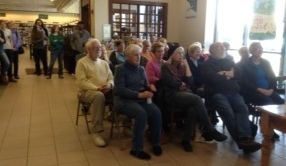 Like a Field of Sunflowers . . .
Like a Field of Sunflowers . . .
Thank you so much—my heart was warmed by your enthusiastic presence as you gathered by the front window with pale early spring light on your upturned faces. I hope you had even a tenth of the fun that I had describing the genesis and challenge of writing The Psalms of Israel Jones and attempting to answer your excellent questions.
Dylan’s Delight
But you were as unpredictable as The Unsmiling One himself during the Dylan trivia contest. You answered with aplomb what I thought was a difficult question:“What award, the nation’s highest for a civilian, did President Obama present Dylan in 2012?” while being stumped by (I thought) the relatively easy “In the early 1980s, Dylan toured with two very well-known popular American bands.” I had a blast giving away 6 books to winners, including my earlier novels, A Bob Dylan Reader and the Columbus Creative Cooperative’s new anthology For the Road.
B & N Rocks
Also, major kudos to host Barnes and Noble for the lovely introduction by the well-informed staff member; for putting out more chairs—even allowing us to borrow some from the café; for gifting me with the poster advertising the event; but, most of all, for allowing a local author who’s not a brand name nor published by one of the big publishers to soak up some of that lovely literary light.
And sell books for you.
Seventeen copies of Israel Jones were sold—and some folks bought other books; I’ll bet many (or a completely new horde of readers) will return when B & N hosts the next local author. Rather than the pleasant surprise Cyndi Pauwels’ turnout seemed to be last fall, maybe solid support for locals is the new normal.
Thank You and Good Night
Thanks for sharing your Saturday with me, when you could’ve been doing a thousand and one other things. Before I go, may I share below a few other local literary goodies in store for great readers everywhere?
Poet David Lee Garrison, author of Playing Bach in the DC Metro, will read at Montage Café in Greenville, Friday, March 27, 7:00-8:00 pm. Montage is located at 527 South Broadway Street, Greenville, OH 45331; it serves informal dinners, wine, and beer. Free and open to the public. I’ve read there and it’s a great venue.
Suzanne Kelly-Garrison will be reading from her Irish American coming-of-age novel, Stolen Child, at Epic Books in Yellow Springs, Friday, April 10, 6:30-8:00 pm. Wine and Irish soda bread will be served in this cozy locally-owned bookstore serving the Dayton area. Free and open to the public. Please read this book!
There will be a reading and book signing by poets and writers represented in the newly-released anthology Every River on Earth: Writing from Appalachian Ohio (Ohio University Press) at the Main Branch of the Dayton Metro Library on Sunday, April 19, from 2:00-3:00 p.m. It includes work by the following Dayton area authors, many of whom will participate in the reading: Ed Davis, Cathryn Essinger, Benjamin S. Grossberg, Hayley Hughes, Herbert Woodward Martin, Julie L. Moore, Lianne Spidel, and Myrna Stone. The Library is located at 215 East Third Street, Dayton, Ohio 45402 (937.463.2665). Free and open to the public.
Answers You’ve Been Waiting For
You’ve got to be rewarded for reading this far, so here’s the answer to the Dylan trivia questions above. Obama awarded Dylan the Presidential Medal of Freedom in 2012, and the two bands Dylan toured with in the early eighties were The Grateful Dead and Tom Petty and the Heartbreakers. But you probably already knew that, right?
March 2, 2015
Breaking in at Barnes & Noble (and the Epic in Yellow Springs)
A Call to Arms
This is a tale of the Little Literary Community that could—and hopefully still can.
Last fall, my friend Cyndi Pauwels set her sights on Barnes & Noble in Beavercreek for the literary debut of her first mystery novel, Forty and Out. She knew she’d have to persuade B & N that she could draw a crowd. Thus, she composed a very convincing letter to Pamela McGill, Community Business Development Manager, which she dropped off personally, along with a copy of the book to prove that it was professionally edited and published.
It worked.
Before the reading, Ms. McGill told her they would mention the event on Facebook and place a poster in the store. Cyndi did the rest, notifying all her friends, personal and professional, well in advance. It didn’t hurt that she’d paid many dues to the region’s literary community (for example, being a work-fellow at the Antioch Writers’ Workshop for many years).
Big Payoff
Cyndi was informed that B & N staff would put out a dozen chairs for the event; as it turned out, they needed at least thirty more. Cyndi did a great job, the event was enjoyable for everyone and B & N sold every single copy of her book and could’ve sold more. Ms. McGill said it was her best event ever, and she even wrote an article on it for the company’s newsletter. (Hopefully corporate heads are listening: there’s a solid market for local writers in the Dayton area.)
A Modest Request
In the wake of Cyndi’s huge success, Barnes & Noble Booksellers has offered me the chance to introduce The Psalms of Israel Jones on Saturday, March 21, 2015 from 2:00-3:00 p.m. at their Beavercreek store in The Shoppes of Beavercreek across the street from the Fairfield Commons Mall. I’m honored and, like Cyndi, hope to convince B & N it was a good idea to take a chance on a local writer.
That’s why I’m asking you to support not only me in particular but all writers in general by a show of force similar to the spectacle Cyndi pulled off last fall. We all know what happened to Borders, and we can’t afford to let that happen to Barnes & Noble, who need to know they can rely on local writers to attract the reading public. See you there? Tell your friends?
This Just In . . .
In coming months, the Epic Bookshop in Yellow Springs will host two writers I highly recommend.
First up, on Friday, March 6, 6:30-8:00 p.m.is Joe Downing, author of The Abundant Bohemian (www.abundantbohemian.com.), which teaches us how to follow our passions and live a life of abundance while giving up the illusion of security. Joe’s voice is intimate, compassionate and self-effacing as he shares wisdom gained by interviewing many artists, writers and other nonconformists, mostly in the Miami Valley.
Then on Friday, April 10 from 6:30-8:00 p.m., Suzanne Kelly (Garrison), will introduce, sign and read from her fine Irish-American novel Stolen Child. As my blog of January 3, 2014 enthusiastically reported, it’s about nine-year-old Lucy’s summer of transformation, when her mother is hospitalized for a terrible, unnamed illness and she must live with her religiously strict paternal grandmother who turns out to have a tongue of fire and an emerald heart. Everyone I know who’s read this novel adores it.
February 4, 2015
News for Readers & Writers
Writers Needed
Are you by any chance looking for a prose writing workshop? I’m currently facilitating a small group meeting monthly at Epic Bookshop in Yellow Springs. Our next meeting is scheduled for February 15, 2-4:00 p.m.
What began last fall as an Autobiographical Fiction group quickly morphed into an Autobiographical Narrative group, critiquing both fiction and memoir. We usually meet 2-4:00 p.m. one Sunday per month and pride ourselves on being as honest, gentle and respectful of other people’s writing.
Some members are unpublished while one member published a novel years ago with a major NY publisher. Because we want to keep the group small, we’re looking for one, possibly two, new members. The cost is $20 due at each session.
If interested, would you please let me know ASAP, including a brief statement about what you’d like to accomplish in such a group? And if you’re not interested right now but know someone who might be, would you pass on the invitation? Thanks.
Listeners Needed
I don’t know about you, but my calendar is already getting nicely populated with literary events for 2015. Just to give you a heads-up on a few:
March 6, 6-8:30 pm: Joe Downing introduces his new work of nonfiction: The Abundant Bohemian at Epic Bookshop in Yellow Springs. Info at abundantbohemian.com.
March 21, 2:00 pm: I’m introducing Psalms of Israel Jones at Barnes & Noble in Beavercreek, and planning some door prizes, trivia, etc. Stay tuned!
April 19, 2:00 pm: Reading at Wright Library in Oakwood by several area writers included in Every River on Earth, a new Appalachian anthology from Ohio University Press. (Julie Moore, Herb Martin, Myrna Stone, Dave Garrison, Lianne Spidel are some of the writers included in the book.)
April 21, 6:30-8:00 pm. Poetry reading at Cedarville Public Library: I’ll be reading alongside Julie Moore and others.
For Readers (Diners and Shoppers)
Last fall I discovered the fabulous Joseph-Beth Booksellers in Norwood, Ohio (actually there are two stores not that far apart. I’ve been visiting the one at 2692 Madison Rd., right off I-71; the other one is close by at 5030 Oaklawn Dr.).
Here are the features I love about Jo-Beth:
It’s huge and includes a children’s store as well as a restaurant with great food and a small coffee shop.
It’s extremely user-friendly with lots of handwritten note cards on eye level directing you to books that knowledgeable staff members know and love.
They create special exhibits of writers, such as the one I saw highlighting Dayton’s own Joanne Smith’s The Thirteenth Gift.
They host lots of events for children as well as adults, all listed in their calendar.
They have an on-line application form for writers to request a reading.
I’ve found both books and music there that would’ve been hard to find elsewhere. (There’s not a ton of music.) They sell a wide assortment of other goods, too, many of them literary.
They have a loyalty program rewarding members with deep discounts.
The Madison Road store is in Rookwood Commons , an upscale shopping center including Nordstrom, Eddie Bauer, Fawn’s Candy and many others.
Your Turn
Would you please let me know of any literary happenings, including readings, bookstores, workshops, conferences and publications . . . even coffee shops that let you hang out, read and write until the place closes? I’m thanking you in advance!
Breaking News
Did you hear that Harper Lee is coming out soon with a novel she wrote in the 1950s with the same characters from “Mockingbird,” only much older? When she showed it to a publisher back then, apparently he fell in love with young Scout in the flashbacks and told her that was the book. The world’s been waiting for another book from her for over 50 years! Who knew it was already written?
Blog image by Florin Gorgan and used by permission under a Attribution-ShareAlike 2.0 Generic license
January 29, 2015
For the Road
January 29, 2015
“Tires crunch, and I merge back onto the highway. Black
tar and metal signs. The road makes sense. Remain
between the painted boundaries, cascade forward like
water in a pipe, be steady and only end by choice. There
is always another curve, exit, or intersection. There is
always a choice.”
“Shadow of the Spider” by Alice G. Otto
New Anthology From CCC
The Columbus Creative Cooperative is at it again with their newest anthology, For the Road, featuring ten stories about life on America’s highways, including my story “Cracked Blacktop.” Since I first blogged about this fine organization on November 10, 2013, I’ve become even more impressed by the energy with which they fulfill their mission: to collaborate for self-improvement and collective publication, promoting writers and artists, with a goal to “print the best work produced in the region.”
That’s good news for both writers and readers.
Editors Par Excellence
Acceptance by CCC guarantees writers the excellent services of co-editors Emily Hitchcock and Brad Pauquette. For my story, I adapted Chapter Four of my novel The Psalms of Israel Jones. I thought it worked pretty well and apparently CCC thought so, too, since they accepted it for the anthology.
However, within weeks after acceptance, Emily e-mailed to say she had a few suggestions for improvement. At first I wasn’t thrilled. Since they accepted it and I felt good about it, what was the problem?
But once I saw the corrections Emily had in mind, I readily agreed that such additions and omissions would complete the transformation of a novel chapter into a stand-alone short story—never an easy task. And some of her suggestions were substantial: for example, a new ending.
Feast for the Mind & Senses
The anthology’s ten stories are an entertaining mix of genre and literary, humorous and deadly serious (and just plain deadly). As Pauquette says in the introduction, “I learned something about the modern perception of the road—we’re terrified of it.”
True enough, most of the selections are scary—and genres range from horror to sci-fi to literary. I especially admired the story I quoted above from Alice G. Otta, an MFA student at the University of Arkansas. There’s something for everyone in these varied, accessible fictions with titles like “Going South,” “Billy White’s Dog” and “The Screaming Bridge.”
Where to Find CCC Publications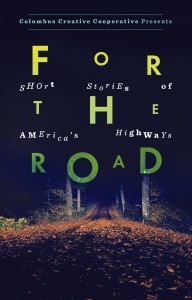
You can purchase For the Road and many other CCC publications at their website: www.ColumbusCoop.org. It’s also available both as an e-book as well as print book at Amazon and Barnes & Noble. If you live in the Columbus area, you can pick it up at many coffee shops like Cup O’ Joe in Lennox Town Center, German Village and Clintonville. I was pleased to find it at Stauff’s, my favorite coffee shop in Grandview.
More Than Publishers
The fine folks at CCC are open to new members and offer free critiquing workshops that are available to nonmembers as well. As I said two years, ago their egalitarian literary efforts deserve our support: by submitting, becoming a member and buying their worthy products. Visit their website and read all about them. And please let me know what you think!
January 12, 2015
Book Nook with Israel Jones
Halloween Surprise
Last fall I launched my new novel The Psalms of Israel Jones and was extremely fortunate to receive an invitation from Vick Mickunas to appear on WYSO radio’s “The Book Nook.” The interview has now been archived and is available at http://wyso.org/post/book-nook-psalms-israel-jones-ed-davis.
Meeting the media has in the past unnerved me: there’s something different between a live performance with the audience present versus the pressurized intimacy of interviewer and interviewee isolated in a small room. However, when Vick interviewed me on a cold, rainy October 31, there was nothing at all frightful about the experience. In fact, I was awed by how smoothly it went.
The Host with the Most
Vick really put me at ease. I’ve been told that he can hold his own with argumentative and controversial authors, but the best words I can find to describe the nearly thirty minutes he generously gave me are “laid-back” and “knowledgeable.”
Writers often bemoan the fact that an interviewer hasn’t read their book and simply wing it with overly-broad questions like “What’s is about?” or “What’s the title mean?” Not Vick. He had read my novel and it showed.
Doing His Homework
Vick tossed me plenty of easy pitches at first and gave me lots of room to bat them back to him before tightening up. It was evident he’d studied my background as well as my book, since he knew I’d been a rock and roller in high school and was raised with a religious background. I felt as if I were talking to an interested listener.
Although Vick used no notes, he was never at a loss for words, showing how well he prepares. He’s also great with follow-up questions, showing he’s a good listener and is willing to probe deeper, making it a real not fake conversation. The times I’ve listened to Book Nook in my car, I felt as if I were right there in the studio.
Furthermore, Vick didn’t dominate the conversation at all but did get his licks in, showing he “got” my book, comparing, for example, the cult who follow Israel in IJ to Deadheads. And he never threw me a single curve ball.
Local Treasure
No wonder Vick has interviewed literally hundreds of writers. And no wonder there was an anguished outcry from listeners years ago when, following a management shakeup, he was briefly bumped from the air. He’s a local treasure, providing a real community service and doubtless does it more for love than money. As anyone can tell from the Book Nook as well as his Sunday book reviews in the Dayton Daily News “Life and Arts” section, he loves books of all types and tries to see the best in those he chooses to review.
Be Patient, Understanding
If you’re a writer—or know a writer—who’d like to be considered for the Book Nook, published books can be mailed to Vick at P.O. Box 3, Yellow Springs, OH 45387 for consideration. (He doesn’t review galleys.) Although I’d sent him my previous two novels to consider, it wasn’t until the publication of Israel Jones by West Virginia University Press that I received an invitation. He’s probably inundated with books, requiring him to be extremely selective.
Personally, I’m grateful I wasn’t on Book Nook sooner, since I was a bit more media-savvy by the time I was eventually asked. I now realize Vick’s the gold standard to which other interviewers may not compare. And I guess that’s okay. Any attention is good attention, as they say, when it comes to media. I’ll hope and pray that’s true.
November 28, 2014
Why It’s Never Too Late to Start Writing
Guest Blogger Joe Downing is the author of The Abundant Bohemian: How To Live an Unconventional Life Without Starving in the Process and the writer of the blog abundantbohemian.com.
“No matter what our age or your life path, whether making art is your career or your hobby or your dream, it is not too late or too egotistical or too selfish or too silly to work on your creativity. ‘I’m too old’ is something we tell ourselves to save ourselves from the emotional costs of the ego deflation involved in being a beginner.” –Julia Cameron
So many of us are called to write, and so many of us ignore that calling. We’ll get to it someday, we say. And for most of us, that day doesn’t come. But it’s never too late. Whether you are a spunky teen or are already receiving your social security check, it’s time to listen to that inner voice and start writing. You have a story to tell. Many stories, perhaps. What’s holding you back? For most, it’s fear of failure. Fear of being ignored or dismissed. Fear of being vulnerable. Yes, all those are possibilities. But the benefits far outweigh the perceived downsides.
First, creative expression is a reward in itself. Yes, creativity is hard. Anything worthwhile is. But we must choose to engage our creativity instead of following the path of least resistance. In The Courage to Write, Ralph Keyes correctly points out that, “Getting there [writing a novel] isn’t always pleasant. Neither is running in a marathon. Or starring in a play. Or climbing a mountain. All such activities require courage. And all reward those who complete them not only with an unparalleled feeling of achievement but with a thrilling sense of adventure along the way.”
Second, if you don’t “succeed” quickly, it doesn’t necessarily mean your writing lacks merit. The stories we read about “overnight success” make for good copy, but are seldom true. Writing in the New Yorker, Malcolm Gladwell provides the example of Ben Fountain, who had been an associate in a law firm for several years when he decided he wanted to write fiction. At first he tried to write after he got home from work, but found that he was too tired to do so. He eventually quit his job, set up a rigorous schedule and wrote every day, writing short stories and a novel that he decided wasn’t good enough and put in a drawer. He then wrote a story that was published in Harper’s and that got the attention of an agent, who got him a book deal for a collection of short stories entitled Brief Encounters with Che Guevera. The collection won the Hemingway Foundation/PEN award, was named a No. 1 Book Sense Pick, was named one of the best books of the year by the San Francisco Chronicle, the Chicago Tribune, and Kirkus Reviews. An overnight success story? Not quite. Here is Gladwell:
Ben Fountain’s rise sounds like a familiar story: the young man from the provinces suddenly takes the literary world by storm. But Ben Fountain’s success was far from sudden. He quit his job at Akin, Gump in 1988. For every story he published in those early years, he had at least thirty rejections. The novel that he put away in a drawer took him four years. The dark period lasted for the entire second half of the nineteen-nineties. His breakthrough with “Brief Encounters” came in 2006, eighteen years after he first sat down to write at his kitchen table. The “young” writer from the provinces took the literary world by storm at the age of forty-eight.
Third, many writers achieved success late in life and you can, too. Marilyn French was almost 50 when she published her first novel, The Women’s Room. It sold more than twenty million copies and was translated into twenty languages, and was considered one of the most influential novels of the 2nd wave feminist movement. Poet Charles Bukowski’s first book wasn’t published until he was 49. Laura Ingalls Wilder’s first book, Little House in the Big Woods, wasn’t published until she was 65. She went on to write seven (yes, seven! All after the age of 65!) more volumes of her Little House series. Raymond Chandler didn’t publish his first short story until he was 45 and his first novel, The Big Sleep, came out when he was 51. James Michener didn’t write his first novel until age 42 and then produced a gazillion bestsellers before he died at age 90. And older writers have an advantage as well: the benefit of a vast well of life experience to draw upon.
“Life, as it is called, is for most of us one long postponement,” Henry Miller said. Are you postponing your writing? Waiting for more time, the right time, or for the right inspiration? There will never be the perfect time. Now is the day to write.
–Joe Downing


